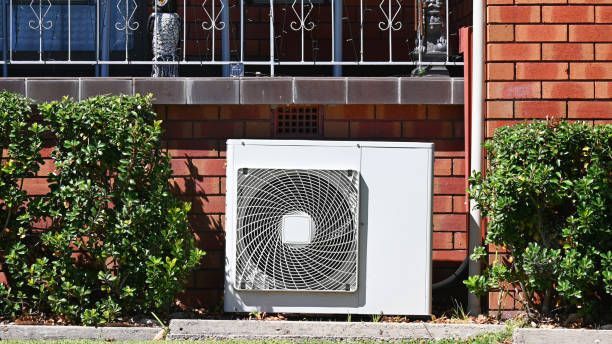Frequently Asked Questions
- Tailored Advice & Service – We recommend solutions based on your layout, needs and usage.
- Workmanship You Can Rely On – We focus on precision, performance and long-term efficiency.
- End-to-End Support – From product selection to post-install servicing, we handle it all in-house.
Frequently Asked Questions
-
How does air conditioning work?
Air conditioning works by using a refrigeration cycle to remove heat and moisture from the air inside a building, cooling it down and providing comfort.
The system consists of a compressor, condenser, expansion valve, and evaporator coil. First, the compressor circulates refrigerant gas, which is pressurized and sent to the condenser, where it cools and turns into a liquid. The liquid refrigerant passes through an expansion valve, which reduces its pressure, causing it to evaporate into a cold gas as it enters the evaporator coils. As air passes over these coils, the refrigerant absorbs heat, cooling the air before it is blown back into the room. The heat-laden refrigerant then returns to the compressor to repeat the cycle.
This continuous process helps maintain a cooler, more comfortable indoor environment.
-
What size air conditioner do I need for my home?
In Australia, the size of the air conditioner you need for your home is based on the same principles as anywhere else, considering factors like the size of the room, insulation, number of windows, and the local climate.
The general rule of thumb is to allow around 20 BTUs per square foot of living space, but because Australia's climate can vary significantly, particularly with warmer temperatures in the summer, you might need a slightly higher cooling capacity, especially in regions like Queensland or Northern Territory. For example, a room around 50 square meters (538 square feet) could require an air conditioner with a capacity of 10,000 to 12,000 BTUs. Additionally, factors such as room orientation, exposure to sunlight, and the number of people in the space can influence the choice of size.
It's best to consult a local expert to ensure the unit meets your specific cooling needs efficiently.
-
How often should I clean or replace the air filters?
In Australia, it’s recommended to clean or replace your air conditioner’s filters every 1-3 months, depending on usage and the environment.
If you live in areas with high dust or pollen levels, or if the unit is used frequently, cleaning or replacing the filters more often is essential to ensure optimal airflow and air quality. In coastal regions, salt buildup can also affect filters, so they may need more frequent attention.
Regular maintenance of filters helps improve efficiency, prevent the buildup of allergens, and reduce the risk of the system overworking, which can extend the lifespan of your air conditioner and lower energy costs.
-
Why is my air conditioner not cooling effectively?
If your air conditioner isn’t cooling effectively, there could be several reasons behind it. Common causes include dirty or clogged air filters, which restrict airflow and reduce cooling efficiency, or low refrigerant levels, which can prevent the system from absorbing and removing heat properly.
Additionally, a malfunctioning compressor or damaged condenser coils can hinder the heat exchange process, and issues with the thermostat, such as inaccurate readings or faulty wiring, can also result in ineffective cooling.
Other potential culprits include poor insulation, leaks in ductwork, or an air conditioner that is too small for the space, causing it to struggle to maintain the desired temperature.
It’s important to diagnose the issue early to avoid further damage and ensure your system operates efficiently.
-
What’s the ideal temperature setting for my air conditioner?
In Australia, the ideal temperature setting for your air conditioner is generally between 22°C and 24°C (72°F to 75°F) for comfort and energy efficiency. Setting the temperature within this range helps maintain a cool environment without overworking the system or wasting energy.
During hot summer months, you can adjust the temperature slightly higher to save on electricity costs, but it's best to avoid setting it too low as that can lead to higher energy consumption and unnecessary strain on the unit.
Additionally, using a programmable thermostat or setting the air conditioner to adjust automatically based on your schedule can further improve efficiency and comfort.
-
How can I improve the energy efficiency of my air conditioner?
To improve the energy efficiency of your air conditioner, start by regularly cleaning or replacing the air filters to ensure optimal airflow and performance.
Ensure that the thermostat is set to an ideal temperature of around 22°C to 24°C, and avoid setting it too low. You can also use a programmable thermostat to control the temperature automatically, adjusting it when you’re not home.
Additionally, keep doors and windows closed when the air conditioner is running to prevent cool air from escaping. Seal any gaps or cracks in your home’s insulation and around windows to reduce heat infiltration. Using ceiling fans to circulate cool air can also help your AC work less hard.
Finally, consider scheduling regular professional maintenance, such as cleaning the coils and checking refrigerant levels, to keep the system running efficiently.
-
Why does my air conditioner smell bad?
If your air conditioner smells bad, it could be due to several reasons.
A common cause is the buildup of mold and mildew, especially in the damp areas like the evaporator coils or the drainage pan, which can produce a musty or sour odor. This happens when moisture accumulates and isn’t properly drained.
Another potential cause is clogged or dirty air filters, which can trap dust, dirt, and bacteria, leading to unpleasant smells. Additionally, if the refrigerant is leaking, it can sometimes cause a chemical odor. In rare cases, a burning smell could indicate electrical issues or overheating components.
To resolve the issue, it’s important to clean the filters and coils, check for leaks, and schedule regular maintenance to prevent further odours.
-
How long do air conditioners typically last?
Air conditioners typically last between 10 to 15 years, depending on factors such as the quality of the unit, how well it’s maintained, and how frequently it’s used.
Regular maintenance, like cleaning the filters, checking the refrigerant levels, and scheduling professional servicing, can help extend the lifespan of your air conditioner. If the unit is over 10 years old and experiencing frequent breakdowns or declining efficiency, it might be time to consider a replacement.
The environment in which the AC operates also plays a role—units in coastal areas may face more wear due to salt exposure, while those in hotter, dustier climates may require more upkeep.
-
Should I get a window unit or central air?
Whether you should get a window unit or central air depends on the size of your home, your cooling needs, and your budget.
Window units are more affordable and are ideal for cooling individual rooms, making them a great choice for small spaces or if you only need to cool specific areas. They are easy to install and don’t require complex ductwork, but they can be less energy-efficient for larger homes.
On the other hand, central air systems are more expensive upfront but provide consistent cooling throughout the entire home, making them better for larger spaces or homes with multiple rooms. Central air is typically more energy-efficient for cooling large areas and offers the convenience of controlling the temperature of the whole house at once.
Consider your home's size, energy efficiency goals, and long-term comfort needs when making the decision.
-
How do I maintain my air conditioning system?
Maintaining your air conditioning system involves regular tasks to ensure it runs efficiently and lasts longer. Start by cleaning or replacing the air filters every 1-3 months to maintain proper airflow and air quality.
Check and clean the evaporator and condenser coils annually to remove dust and debris that can impede cooling performance. Ensure that the drainage system is clear, as clogged drains can lead to water damage or mold growth.
Inspect the refrigerant levels and have a professional top them up if necessary, as low levels can reduce efficiency. Keep the area around the outdoor unit clear of debris, and check for any visible signs of wear or leaks in the ducts.
Scheduling an annual tune-up with a qualified technician is also a good idea to ensure everything is working correctly and to catch any potential issues early. Regular maintenance can improve efficiency, reduce energy costs, and extend the lifespan of your AC system.
-
What causes air conditioners to freeze up?
Air conditioners can freeze up for several reasons, often related to airflow or refrigerant issues.
One common cause is a clogged or dirty air filter, which restricts airflow and prevents the system from receiving enough warm air to balance the cooling process. When airflow is reduced, the evaporator coils can get too cold and ice over.
Another potential cause is low refrigerant levels, which can lead to a drop in pressure and cause the coils to freeze. Additionally, a malfunctioning thermostat or an improperly set temperature can lead to overcooling, which can also result in freezing. Poor airflow from blocked vents or ductwork, or a dirty evaporator coil, can contribute to this problem as well.
To prevent freezing, ensure proper maintenance, regular filter changes, and promptly address any refrigerant issues.
Trusted Brands & Industry-Approved Systems
Enterprise Air provides residential and commercial air conditioning services, including installation, servicing, and repairs. With over 20 years of experience, we deliver tailored solutions using trusted brands and industry-approved systems.
Our qualified team works across Bundaberg and surrounding areas, including Bargara, Innes Park, Kepnock, Coral Cove and Norville. Call (07) 4154 3211 to speak with our team today.
Contact Us For A
No Obligation Quote








